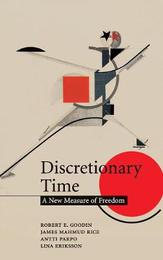
|
Discretionary Time: A New Measure of Freedom
Hardback
Main Details
| Title |
Discretionary Time: A New Measure of Freedom
|
| Authors and Contributors |
By (author) Robert E. Goodin
|
|
By (author) James Mahmud Rice
|
|
By (author) Antti Parpo
|
|
By (author) Lina Eriksson
|
| Physical Properties |
| Format:Hardback | | Pages:482 | | Dimensions(mm): Height 235,Width 160 |
|
| ISBN/Barcode |
9780521882989
|
| Classifications | Dewey:306.361 |
|---|
| Audience | | Professional & Vocational | |
|---|
| Illustrations |
41 Tables, unspecified; 41 Line drawings, unspecified
|
|
Publishing Details |
| Publisher |
Cambridge University Press
|
| Imprint |
Cambridge University Press
|
| Publication Date |
21 February 2008 |
| Publication Country |
United Kingdom
|
Description
A healthy work-life balance has become increasingly important to people trying to cope with the pressures of contemporary society. This trend highlights the fallacy of assessing well-being in terms of finance alone; how much time we have matters just as much as how much money. The authors of this book have developed a novel way to measure 'discretionary time': time which is free to spend as one pleases. Exploring data from the US, Australia, Germany, France, Sweden and Finland, they show that temporal autonomy varies substantially across different countries and under different living conditions. By calibrating how much control people have over their time, and how much they could have under alternative welfare, gender or household arrangements, this book offers a new perspective for comparative cross-national enquiries into the temporal aspects of human welfare.
Author Biography
Robert E. Goodin is Distinguished Professor of Philosophy and Social & Political Theory in the Research School of Social Sciences at Australian National University. James Mahmud Rice is an ARC Research Associate in the Research School of Social Sciences at Australian National University. Antti Parpo is Administrator of Somero Social & Health Services, Finland. Lina Eriksson is an ARC Research Associate in the Research School of Social Sciences at Australian National University.
Reviews'Only a group of scholars led by Bob Goodin could be sufficiently intellectually daring to replace money with leisure time as the metric of welfare achievement. In an era in which "time to stand and stare" becomes ever scarcer, this is a book on the impacts of public policy which really matters.' Francis G. Castles, Professor of Social and Public Policy, University of Edinburgh 'Confronting Marx's capitalist 'realm of necessity' head on, Goodin and his co-authors replace money with time as the measure of freedom and ask: "how much control do citizens of OECD countries have over their allotments of time?" Don't be intimidated by the numbers and tables - the result is a fresh view of cross-national inequities, replete with new recipes for reform.' Stephan Leibfried, Professor of Public Policy, University of Bremen and Head of the Research Center for Transformations of the State 'The conclusion of Discretionary Time, an academic text based on a wealth of data from OECD countries, is that most of us have no one but ourselves to blame for our time-scarce predicament. Time pressure, they argue, suggests compulsion.' Financial Times
|